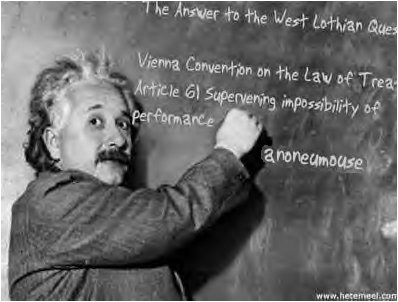News for Mr Sillars
JIM Sillars, a former SNP MP, has cast further doubt over plans for an independence referendum by claiming the policy has been rejected as illegal by official civil-service advice.
SNP plans for a referendum on independence have been in the spotlight over the past few days because of confusion as to when an SNP-led government would publish a bill on a referendum and when the referendum would take place. (Scotsman)
Mr Sillars has obtained a series of background briefing papers for ministers under the Freedom of Information Act. They state that it would be illegal for any minister to play any part in a referendum on the constitution, questions of which are reserved to Westminster.
I have news for Mr Sillars

Under international law, the only effect one Independent State can have upon another Independent State is through the obligation and terms of a bi-lateral Treaty. This principle is embodied in Article 27 of the Vienna Convention on the Law of Treaties , that states: a “…party may not invoke the provisions of its internal law as justification for its failure to perform a treaty.”
The UK Government draws up on its LEGAL BASIS from The Treaty (or Act) of Union, 1707.
Article 4 of the Act of Union states: "That all the subjects of the United Kingdom of Great Britain shall from and after the Union………have the same Rights Privileges and Advantages"
The people of England & Scotland, since devolution, have had different rights, privileges and advantages. The treaty of union is therefore null and void and England or Scotland can withdraw using the provision of Article 61 of the Vienna Convention on the Law of Treaties.
Article 61 Supervening impossibility of performance
A party may invoke the impossibility of performing a treaty as a ground for terminating or withdrawing from it if the impossibility results from the permanent disappearance or destruction of an object indispensable for the execution of the treaty. If the impossibility is temporary, it may be invoked only as a ground for suspending the operation of the treaty.
And that is the Answer to the West Lothian Question.
.
SNP plans for a referendum on independence have been in the spotlight over the past few days because of confusion as to when an SNP-led government would publish a bill on a referendum and when the referendum would take place. (Scotsman)
Mr Sillars has obtained a series of background briefing papers for ministers under the Freedom of Information Act. They state that it would be illegal for any minister to play any part in a referendum on the constitution, questions of which are reserved to Westminster.
I have news for Mr Sillars

Under international law, the only effect one Independent State can have upon another Independent State is through the obligation and terms of a bi-lateral Treaty. This principle is embodied in Article 27 of the Vienna Convention on the Law of Treaties , that states: a “…party may not invoke the provisions of its internal law as justification for its failure to perform a treaty.”
The UK Government draws up on its LEGAL BASIS from The Treaty (or Act) of Union, 1707.
Article 4 of the Act of Union states: "That all the subjects of the United Kingdom of Great Britain shall from and after the Union………have the same Rights Privileges and Advantages"
The people of England & Scotland, since devolution, have had different rights, privileges and advantages. The treaty of union is therefore null and void and England or Scotland can withdraw using the provision of Article 61 of the Vienna Convention on the Law of Treaties.
Article 61 Supervening impossibility of performance
A party may invoke the impossibility of performing a treaty as a ground for terminating or withdrawing from it if the impossibility results from the permanent disappearance or destruction of an object indispensable for the execution of the treaty. If the impossibility is temporary, it may be invoked only as a ground for suspending the operation of the treaty.
And that is the Answer to the West Lothian Question.
.



0 Comments:
Post a Comment
<< Home